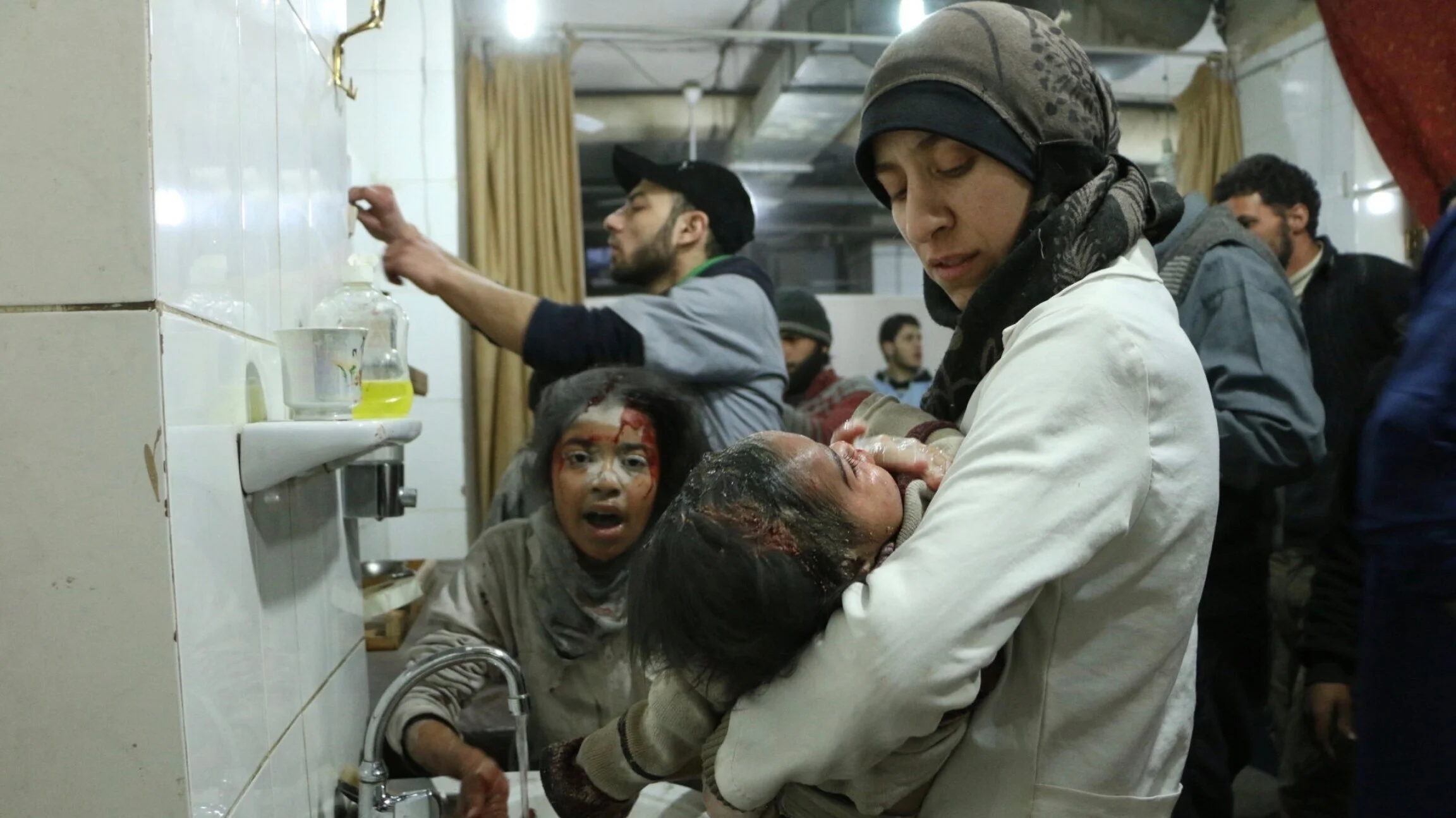The Cave
A young woman fights misogyny and Russian bombs as she tends to the dying in this essential and heart-rending humanitarian film.
Why are the Russians killing our children? It’s a question that is posed daily by the inhabitants of Ghouta, a suburb of Damascus in Syria. For over five years, Russian warplanes have been screaming over the city delivering death in ear-splitting packages. Entire streets disappear in clouds of smoke and rubble and more friends and family members are never seen again. Nowhere on earth can resemble such a living hell. With hospitals and its personnel as prized targets, the medics and care-workers have been forced underground in order to tend to their mutilated charges. And as the years blend into each other, the doctors suffer from headaches, despair and stress unimaginable by most in the Western world.
The Syrian documentarian Feras Fayyad (Last Men in Aleppo), filming between 2016 and 2018, focuses his team’s cameras on one particular subterranean makeshift clinic dubbed ‘the Cave’, clocking up several hundred hours of footage. But his film is not just a modern war tract; it is a character study of a woman in her twenties who has decided to do the right thing. Yet even as Amani Ballor obviously believes this, her husband demands that she abandon her ideals and, by him, “do the right thing.” And so the film becomes a feminist issue as well. Even as she is saving the lives of hundreds, a man berates her – on camera – for doing so as a woman.
A modern-day Mother Teresa figure, Dr Amani gives voice to the narrative, her words etching their way into our collective memory. She instructs her staff to do the impossible, to “keep on smiling for the children,” while asking, “is God really watching?” Then, later, she dares to tell us that, “religion is just a tool for men.” In amongst the pandemonium, Amani Ballor cuts a calming, almost saint-like figure, even when the camera catches her crying in an unguarded moment.
But there are other characters here to cherish, not least the surgeon who props up his phone to play classical music while performing his operations, arguing that it is the only anaesthetic available to them. And there are the patients: the 13-year-old child so malnourished that she has no muscles left. And, for a while, the faces of those beautiful children are the only tonic to keep everybody going. Then, just as we imagine that things cannot get any worse, a new menace permeates the catacombs: patients young and old are dying without any apparent symptoms. It is then that we become aware of the horrendous toll of the chlorine bombardment authorized by the Syrian president, Bashar al-Assad.
Inevitably, The Cave has been compared to Waad Al-Khateab’s heart-rending, humanitarian For Sama, as both films explore the same territory and at times are almost indistinguishable. But there are documentaries that achieve their dramatic goal through a collection of powerful images and there are documentaries that, in the right hands, power a narrative that is even more immediate and potent. A case in point is the breath-taking opening shot of The Cave, a panoramic view of Ghouta smouldering from its guts when, moments later, it is blasted into rubble, after which the camera drops below ground, all in one continuous take. It is completely numbing.
Had The Cave been released before For Sama, its reception might have been altogether more enthusiastic. As a companion piece, and as a document of an extraordinary woman – and misogyny under fire – it is an essential work of cinema that demands to be seen at the next G20 summit. Yet when Feras Fayyad’s Last Men in Aleppo was nominated for an Oscar for best documentary in 2018, he almost missed the ceremony because his visa was rejected in response to an executive order from Donald Trump. Only the day before, when papers were significantly shuffled, was he able to attend. In the meantime, almost 20,000 Syrian refugees have drowned in the Mediterranean while seeking salvation from kindlier regimes. And scariest of all is that, unlike Saddam Hussein, Bashar al-Assad is not only still alive, but still in power - and still attacking his own people.
JAMES CAMERON-WILSON
Featuring Amani Ballor, Dr Salim Namour, Samaher.
Dir Feras Fayyad, Pro Sigrid Dyekjær and Kirstine Barfod, Screenplay Alisar Hasan and Feras Fayyad, Ph Muhammed Khair Al Shami, Ammar Sulaiman and Mohammad Eyad, Ed Denniz Göl Bertelsen and Per K. Kirkegaard, Music Matthew Herbert, Sound design Peter Albrechtsen.
Danish Documentary/Hecat Studio-Dogwoof Pictures.
106 mins. Syria/Denmark/Germany/Qatar/USA. 2019. Rel: 6 December 2019. Cert. 15.


